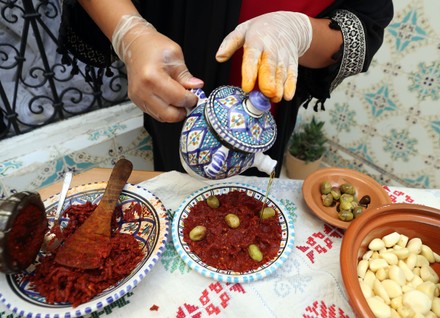In Nabeul, Tunisia’s largest city in the harissa-producing Cap Bon region, local chef and harissa expert Chahida Boufayed carefully prepares the popular condiment, a vibrant red paste made from peppers, garlic, vinegar, and spices. For Boufayed, making harissa is more than just a craft; it’s a passion.
“I don’t make it for money, but out of love. It’s a love story between me and harissa,” says Boufayed, who prides herself on using organic, chemical-free peppers. “I choose only the best.”
At Nabeul’s 10th annual Harissa Festival, crowds flock to her stall to taste the fiery paste, which is a staple in Tunisian homes, restaurants, and street food stalls. The condiment can be spread on bread with olive oil, used to enhance eggs, fish, stews, or sandwiches, and is often paired with merguez sausages or smeared on savory pastries and sandwiches.
The festival, which attracts both local aficionados and international visitors, has grown in prominence, especially since UNESCO added harissa to its intangible cultural heritage list in December 2022. UNESCO describes harissa as “an integral part of domestic provisions and the daily culinary and food traditions of Tunisian society.”
Now recognized alongside iconic cultural traditions such as Ukrainian borscht and Cuban rum, harissa is beloved not just in Tunisia and North Africa, but in countries around the world, from France to the United States and China. Often compared to Sriracha, the North African hot sauce is traditionally made by women who sun-dry Baklouti red peppers before deseeding, washing, and grinding them.
Kabira Berrich, a local harissa producer, explains the various types: “There’s steamed harissa, made from red peppers that are cleaned, dehydrated, and steamed with garlic and cumin. Then there’s the traditional variety, made from dried peppers, and smoked harissa.”
Zouheir Belamin, president of the Association for the Preservation of the City of Nabeul, which organizes the festival, says the event has become a symbol of both culinary pride and cultural heritage. “Since harissa’s inclusion on UNESCO’s list, this festival has played a significant role in highlighting Nabeul as a hub for Tunisia’s artisanal products,” says Belamin. “It has contributed to the prominence of Nabeul and attracted many tourists and visitors to the city.”
The Nabeul Harissa Festival, now in its 10th year, is more than just a culinary event. It celebrates Tunisian cultural identity and honors artisans like Boufayed who preserve the traditional methods passed down through generations. With its growing popularity worldwide, harissa is gaining recognition as a global culinary treasure.

